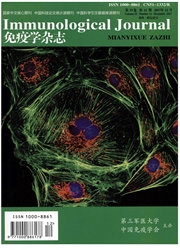

 中文摘要:
中文摘要:
目的本研究在前期工作基础上,对中药土槿皮有效成分土槿乙酸进行结构改造,得到新型衍生物氢化土槿乙酸(hexahydropseudolaric acid B,HPB),通过体内外研究,初步揭示其对T淋巴细胞的免疫调节作用及分子机制。方法首先,通过体外细胞培养鉴定HPB的免疫抑制活性及细胞毒性,进而以二硝基氟苯(2,4-Dinitrofluorobenzene,DNFB)诱导建立T细胞介导的迟发型超敏反应(delayed-type hypersensitivity,DTH)模型,口服不同剂量HPB进行干预,检测小鼠耳肿胀度、计算脾脏指数,综合评价HPB的药效学作用。最后,通过ELISA、Western blot分析等方法分析HPB对T细胞免疫抑制作用的分子机制。结果 HPB体内外均能明显抑制T淋巴细胞增殖及T细胞介导的细胞免疫应答,且安全性高,其免疫抑制作用的分子机制可能与上调IL-10、影响JNK信号通路有关。结论本研究结果有望为研制高效低毒的新型抗炎免疫调节剂奠定基础,应用开发前景广阔。
 英文摘要:
英文摘要:
We explored the immunosuppression effect of a novel pseudolaric acid B derivant, hexahydropseudolaric acid B (HPB) both in vitro and in vivo, and further investigated its underlying molecular mechanism to T lymphocytes. Firstly, cell culture was used to test the effects of HPB on T cells in vitro. Then, ear swelling and spleen index were measured after oral administered with HPB in the mouse model of delayed-type hypersensitivity (DTH) to analyze its immunoregulation effect. Finally, the molecular mechanism of HPB on T lymphocytes was further investigated by ELISA and Western blotting. The results showed that HPB could significantly inhibit the proliferation of T cells and cellular immune response both in vitro and in vivo, which might be related closely with up-regulating the level of IL-10 and affecting JNK pathway. Our study supports the need of continued efforts to characterize the efficacy of HPB as a promising and safe candidate in anti-inflammation and immunoregulation.
 同期刊论文项目
同期刊论文项目
 同项目期刊论文
同项目期刊论文
 A novel pseudolaric acid Bderivative, Hexahydropseudolaric acid B, exterts immunomodulatory effect i
A novel pseudolaric acid Bderivative, Hexahydropseudolaric acid B, exterts immunomodulatory effect i 期刊信息
期刊信息
